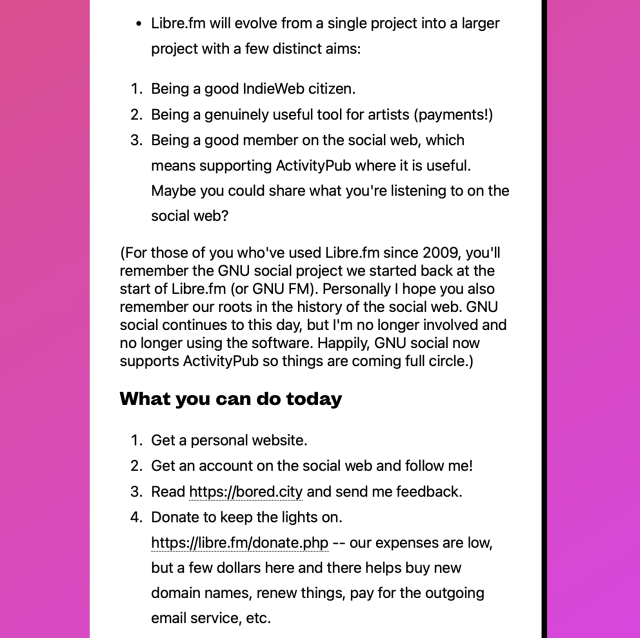Search
Items tagged with: activityPub
EU is calling for comments on open source strategies. MAKE YOURSELF HEARD!
Even non-EU citizens have a voice here.
NOW is a time to stand up and stand out! YOU want to help the Fediverse? Here's just one way today that YOU can REALLY make a difference:
The European Open Digital Ecosystem Strategy will set out:
- a strategic approach to the open source sector in the EU that addresses the importance of open source as a crucial contribution to EU technological sovereignty, security and competitiveness
- a strategic and operational framework to strengthen the use, development and reuse of open digital assets within the Commission, building on the results achieved under the 2020-2023 Commission Open Source Software Strategy.
ec.europa.eu/info/law/better...
#EU #open #foss #openSource #source #linux #activitypub #AP #fedi #fediverse
What are you looking for in social media? (1/N)
privacy.thenexus.today/what-ar…
Since you're seeing this on fedi -- or Bluesky, Blacksy, or elsewhere in the ATmosphere -- you already know the value of alternative social media that's not controlled by techbro white supremacist CEO's who make money by exploiting their users and working with their cronies in authoritarian governments.
But, what we have today is only the tip of the iceberg of what's possible.
Reasons for optimism at the turn of the year: reflections on the fediverses, the ATmosphere, and whatever comes next
privacy.thenexus.today/reasons…
#fediverse #ActivityPub #ATmosphere

Reasons for optimism at the turn of the year: reflections on the fediverses, the ATmosphere, and whatever comes next
There really is a lot of exciting stuff happening!Jon (The Nexus Of Privacy)
FOSDEM 2026 Social Web Speakers
I have been trying to create a list for #fosdem26 and realized that (ironically) most of the people in the socialweb track ... does not have a fediverse account listed there.
I am also at fault, btw, so shame to me.
If you know someone who is presenting at #fosdem26 please send them my way. I will update this thread with the list of confirmed speakers.
The Fosdem 26 social web track List:
@pfefferle
@andypiper@macaw.social
@andypiper@flipboard.com
@evan @evanprodromou
@haubles
@mapache
@darius
@bjoernsta
@django
@resieguen
@openforfuture
@iusondemand
@cwebber
@tsyesika
@zzepposs
@melaniebartos
@Pepijn
@Floppy
@tobias
@mayel
@ivan
@hongminhee@hackers.pub
@samvie
@benpate
@neiman
@hongminhee@hollo.social
Social Web Track
fosdem.org/2026/schedule/track…
Boosts are also appreciated!
P.S. Special thanks to @liaizon for the suggestions.
I consider this a failure on our part but I don’t really know what to do about it. Most arguments against #XMPP don’t hold if you’re building from scratch anyway:
• #Conversations_im looks very outdated: OK, but you are developing your own clients anyway.
• XMPP doesn’t have an SDK: Neither does your #ActivityPub or email stack
• OMEMO is insecure and I would prefer #MLS: Yes, let’s work on that together and you’ll still benefit from XMPP’s 100+ solved IM problems.
So, given WP is willing to sell all its users down the river for some quick "AI" buzz, what fedi-enabled alternatives exist for human-centric websites? therepository.email/wordpress-…
I know of write.as, plume. They're to ascetic to match the brief. ClassicPress could be an option, provided the WP-ActivityPub add-on works with that.
#wordpress #ActivityPub #CMS #noAI #fediverse
cc @davidgerard
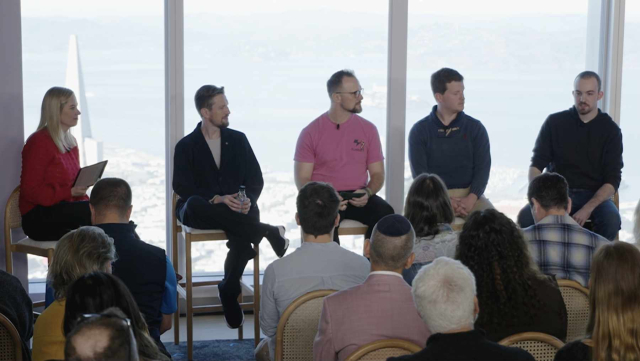
WordPress AI Team Outlines Vision for AI as a “Fundamental” Part of WordPress
The AI Team has published a series of posts laying out a vision to make AI as fundamental to WordPress as the database, calling on developers and hosts to adopt…Rae Morey (The Repository)
Sync Fediverse contacts to CardDav Account
!Fediverse - Does anyone know of a service or feature that can sync the fedivers/ #activitypub accounts that an account (or.accounts) follows and/or is followed by - into a #CardDav account?
My use case is thus - As a person with a Mastodon and/or Lemmy, Pixelfed, Friendica, GotoSocial accounts - I would like to syncronise the profiles of the accounts I follow and/or the accounts that I follow into an existing CardDav account in which I record the names, emails, phone numbers, profile pictures of the people I know. I would like the syncronisation to either simply relflect the information held in each fediverse account - allowing me to use a sepatate contact merging service - or optionally to append/update information to existing contacts in a nominated CarDav account so that I can have one complete CardDav record reprenting people i know across Fediverse and other contact points.
I remember when I used to be able to sync my Facebook friends with my address book, my contacts from Skype and it was useful.
It would also make sharing my Fedi details with others easier ..I could just message them a Carddav file.
Does this make sense? Does it exist? Shoud it exist? @DAVx⁵ :android:🔄 - Is this somehow related tonwhat you are doing or do you know relevant related services - Maybe CardDav merging tools? Is it something @Thunderbird: Free Your Inbox would/could do?
After reading about a major #Funkwhale instance shutting down, I'm wondering whether I should keep my podcast on open.audio.
blog.liberta.vip/libertadmin/i…
However, the idea of an audio app that uses #ActivityPub to be part of the #Fediverse is excellent.
Any suggestions on where to host a #podcast?
P. S. I just discovered @Castopod , an alternative to @funkwhale
I want to inspect which one is more stable, and if there are good servers as well. Feedback welcome!
Fun fact: I bought my own social network at around the same time Elon bought his.
Mastodon, Matrix, ActivityPub, XMPP, ATProto. whatever your flavor of decentralization is, there’s room for you.
Submit your proposal to the Decentralized Communication devroom at FOSDEM before the end of this week!
In the upcoming release you will be able to follow any blog on the XMPP network directly by clicking on the [Follow] button without being mutually friends (like it was until now), its a small change but with big impacts 😁!
We wrote a detailed and accessible article that explains the differences between the #XMPP network and the #Fediverse and shows how blogs are handled on the XMPP network a bit more in details 😸
If you are curious to see how XMPP works (spoiler: it's pretty simple in the end 😌) checkout our article (and don't forget to leave a ♥️ or a comment!
mov.im/community/pubsub.movim.…
Movim • The difference between XMPP and ActivityPub, explained through the Blog feature 🗒️✨
Blogs are one of the historical features of Movim, the upcoming 0.32 release will redefine how…mov.im
@TheDailyBurble, happy to help.
Another cool feature of #XMPP are "gateways" that make it relatively easy to connect with other IMs.
e.g.
#Libervia to #ActivityPub and #email (CC @Goffi )
nlnet.nl/project/Libervia
libervia.org
#Slidge to all sorts of other IM like #Matrix, #Mattermost, #Steam, #Discord, #Whatsapp, FB … (CC @nicoco )
slidge.im — Gateways from XMPP to Other Networks
Slidge is a chat gateway library for XMPP built in Python, and a set of gateways for other networks.slidge.im
There is no way in #PeerTube to essentially 'boost' (retweet) a video from another instance, is there?
I want people to be able to go to my PeerTube instance and watch a video that I recommended without leaving my instance but all likes and comments should obviously go to the original source. (And the video itself should obviously be streamed from the original source as well.)
I’m watching @pfefferle’s talk on the #ActivityPub plugin for #WordPress, which he gave at @berlinfediday and look who made it onto one of his slides: @vanitasvitae. Small world.
Another curious #ActivityPub / #MastodonAPI issue.
A Mastodon server is sending me a DELETE message.
The delete is because a user has been deleted.
My server tries to validate the HTTP Signature.
My server looks up the deleted user's main-key.
The user has been deleted so the public key 404s.
My server never acknowledges the delete, so the other server keeps sending me the same request.
So… How do I validate the signature of a deleted user?
RE: activitypub.blog/2025/10/01/7-…
Version 7.5.0 of the #ActivityPub plugin for #WordPress is out, and it now lets you quote posts! 😍
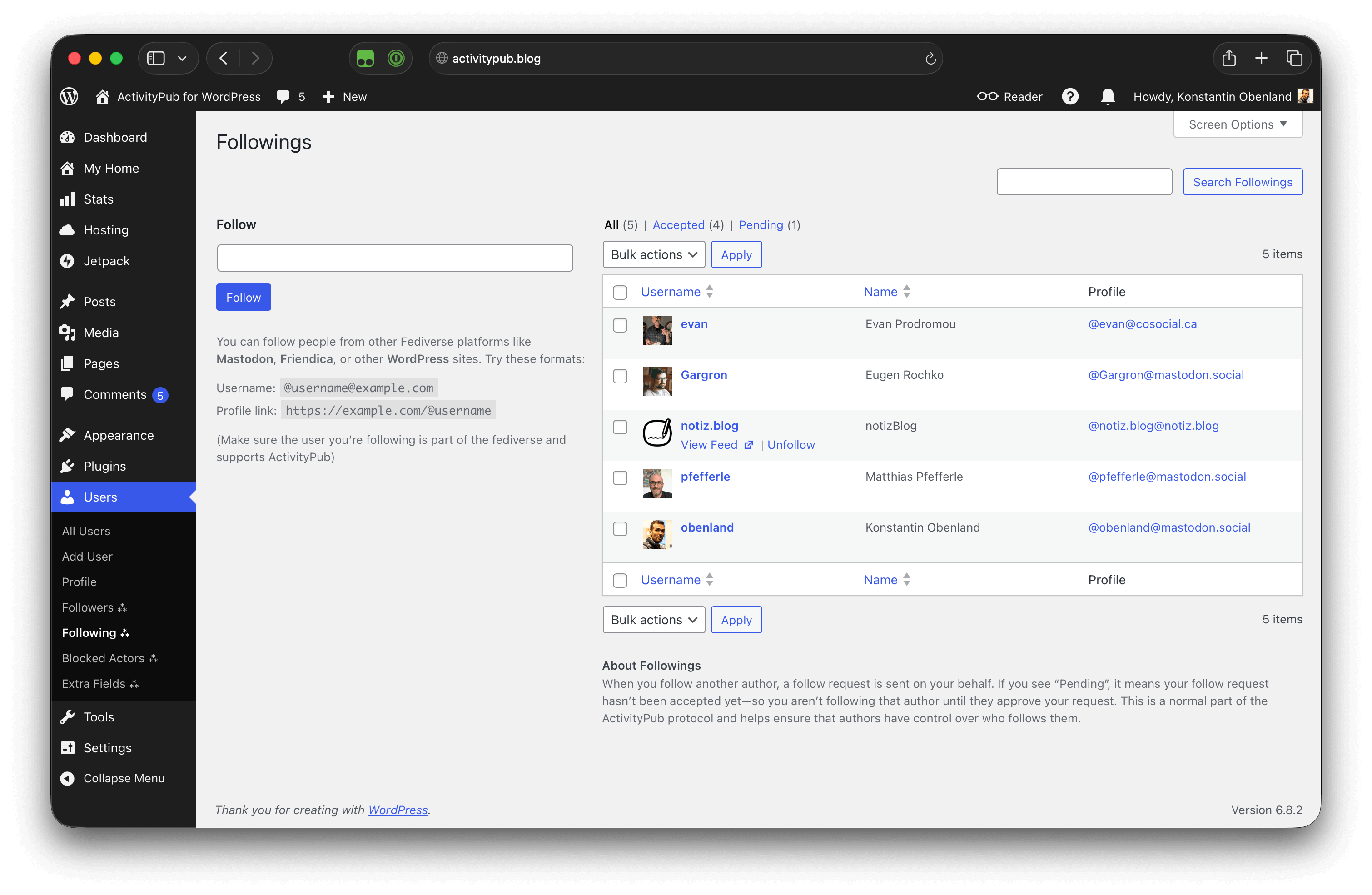
7.5.0 — Follow the Feed, Quote the Lead
We’re back with a fresh release, and this one makes following and sharing smoother than ever—plus gives you more control over how your posts can be quoted.ActivityPub for WordPress
[View Orginal URL] is a bug in the federation model.
spectra.video/w/72dbS6nFMwrgEt…
Great talk by @julian. Thank you!
#nextcloud made it possible for me to (self-)host my (and my family's) phone calendars, contacts, and even when pictures are taken, they get uploaded to our Nextcloud instance, and NOT to google/apple.
10/10, would recommend for any household looking to #degoogle.
Others include #searxng, has literally replaced all monolithic search engines, works great, no ads or AI
#mastodon, for my #activitypub based social network
#matrix for chatting with my social network
and also #KDE.
Eagle-eyed product developer @parkerortolani spotted something in Apple's WWDC 2025 presentation: Mastodon. During designer Billy Sorrentino's section on visual intelligence, there's a clear shot of @ivory. "It was clearly both a way to subtly show developers what they can do with their own apps, but also read as a sort of endorsement of Mastodon as a social platform," Ortolani writes on his blog. "Apple didn’t show Bluesky, Threads, or X. They chose to show a third-party Mastodon client."
#Tech #Technology #Mastodon #Ivory #ActivityPub #Fediverse #Apple #WWDC
I want to follow everything via ActivityPub/Fedi. For everything else, there's RSS.
#rss #thunderbird #fedi #fediverse #ActivityPub #bsky #BlueSky
I think I’ve found a relatively nice solution for #FediLinks in #Conversations_im.
You can put web+ap URIs into a message (or room description) and ideally a click on those will open your Mastodon client. However if no installed app supports those (the only app that I’m aware of is Fedilab) Conversations will open a browser instead.
Currently no app will create web+ap links but it is fairly easy to handcraft them.
cc @SoniEx2
In the last few months, many people have called on the EU to start supporting open alternatives to US-owned social media sites. The thing is: The EU has been doing that for some time already. It has financed, among others, ActivityPub, Mastodon and PeerTube. For @netzpolitik_feed, we spoke to Michiel Leenaars, who professionally gives out buckets of EU cash to open source projects.
#eu #europeanunion #opensource #activitypub #mastodon
netzpolitik.org/2025/open-sour…

Open source funding on the brink: „Delivering what’s needed to make Europe sovereign“
The EU is paying a fortune for broken commercial software, criticizes Michiel Leenaars of the Dutch NLnet Foundation in an interview with netzpolitik.org. Together with his team, he supports open-source, free solutions — funded by the EU.netzpolitik.org
!Friendica Support is there a reason i can't set notifications for new post of friends on #Bluesky (via the plug-in)
like I can for friends that are using #ActivityPub?
Happy 7th anniversary of becoming an official W3C standard, ActivityPub!
w3.org/news/2018/activitypub-i…
We're creating something truly special here with the fediverse, and I am so thankful for everyone who contributes to it, whether with your time, money, or just by sharing your thoughts, your creations, your silly little jokes. Keep it up!
#fediverse #activitypub #standards #OpenWeb #anniversary

ActivityPub is now a W3C Recommendation
The World Wide Web Consortium (W3C) is an international community where Member organizations, a full-time staff, and the public work together to develop Web standards.W3C
“Event Bridge For ActivityPub” plugin released on WordPress.org
It’s been a long road, but now a first version (v0.3.5) of the plugin is available via the official plugin sources on WordPress.org.
wordpress.org/plugins/event-br…
Further features are almost ready and will follow in the coming days. This is includes some more complex features like aggregating events from other remote ActivityPub actors and improvements like better accessibility in the admin UI.
We are looking forward to feedback from users. You can find our guidelines for contributing here.
Unfortunately, interoperability with other applications is still limited, often caused by unresolved issues within other applications. However, we all are all working on it and are confident that things will be smoothed out in the course of this year!
Migration to Codeberg
This was a good reason for us to move the repository from our self-hosted Forgejo to Codeberg.org for several reasons:
- less maintenance
- less hurdles to contribute
- @Codeberg is awesome
- we love Forgejo actions and can still use our own Forgejo-runner
Acknowledgement
We’d like to thank @NGIZero and @nlnet for allowing us to spend the considerable time we’ve put into developing this plugin.
#ActivityPub #codeberg #Events #WordPress

runner
Forgejo runner - alpha release, should not be considered secure enough to deploy in productionForgejo: Beyond coding. We forge.
🚀 Novinka od týmu OSCloud! 🌟
S radostí vám představujeme naši vlastní PeerTube instanci: VHSky.cz! 🎥✨
📽️ VHSky.cz je komunitní platforma pro sdílení videí. Bez reklam, bez sledování, jen čistá radost z tvorby a sdílení. 🐾
Hostujte svá videa.
Objevujte originální obsah.
Připojte se k nám a buďte součástí komunity! 🌍
🛡️ Co je PeerTube?
PeerTube je open-source platforma pro sdílení videí, která nabízí decentralizovaný přístup k hostování.
Žádné reklamy, žádné sledování.
Umožňuje propojení s dalšími instancemi díky síti federace.
🔒 Bezpečnost a soukromí
Vaše soukromí je naší prioritou. Na VHSky.cz:
Neshromažďujeme zbytečná data.
Data jsou chráněna a bezpečně ukládána.
💡 Proč to děláme?
Chceme vytvořit prostor, kde mohou tvůrci a diváci sdílet a objevovat videa bez vlivu korporací. Naším cílem je podporovat svobodu projevu, komunitní spolupráci a bezpečnost na internetu.
📝 Registrace
Registrace na VHSky.cz jsou aktuálně schvalovány moderátory, aby byla zajištěna kvalita obsahu a bezpečné prostředí.
Máte zájem? Kontaktujte mě, nebo @cynik_obecny přímo tady, nebo navštivte vhsky.cz.
#opensource #peertube #fediverse #Video #activitypub
New: A Conceptual Model of ATProto and ActivityPub
You might want to know a little bit more about how #Bluesky and #atproto works, without needing to know all the technical details. This is a high level overview of how to think about how atproto works, and how it differs from #ActivityPub.
It is also a reflection on the concepts of decentralisation and federation, and what they bring to both the #fediverse and the #atmosphere
Read at: fediversereport.com/a-conceptu…
A conceptual model of ATProto and ActivityPub
If you were to design an open social networking protocol, what would that look like? Which metaphors and comparisons would you use to get a general idea of how the network functions? And what would you answer if people ask if your network is decentra…fediversereport.com
Some of you may have noticed a new logo appearing in various places around the web.
🎉
We now have a new logo for Librecast thanks to @mray
You may already be aware of his work as he designed the #ActivityPub logo.
It's been a work in progress and if you're curious about the progress @mray has been livestreaming his progress as the design came to shape.
peertube.stream/search?tagsAll…
PeerTube
Instance PeerTube principalement dédiée aux directs. Bien entendu vous pouvez également publier vos vidéos favorites ici !peertube.stream
Looks like Libre.fm, an open-software version of Last.fm by the GNU Project, is being reworked to support ActivityPub!
#LibreFM #LastFM #Fediverse #SocialWeb #IndieWeb #ActivityPub #GNU #GNUProject #Music #FediMusic



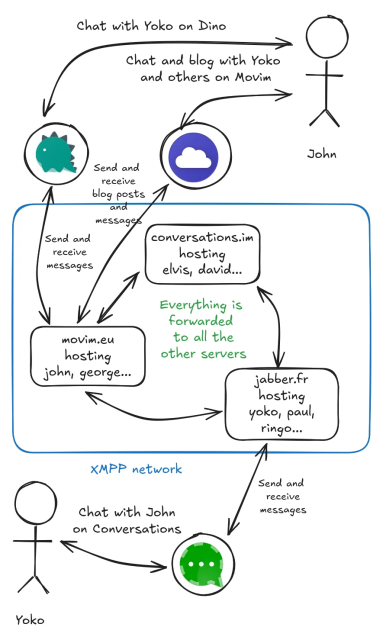
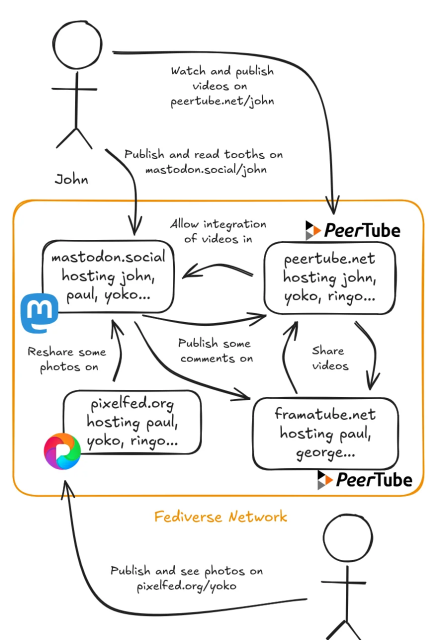
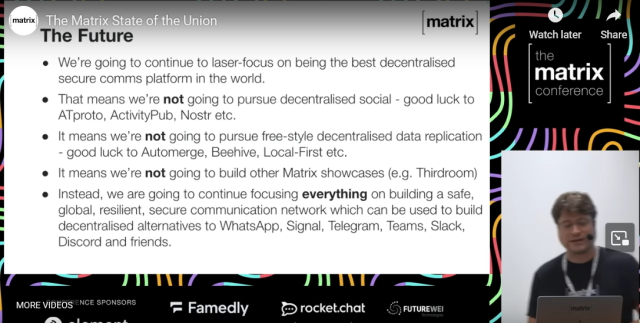
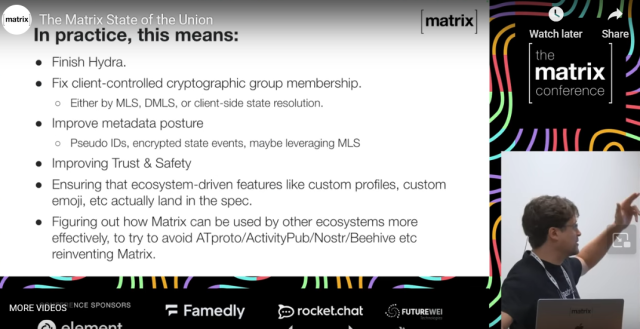
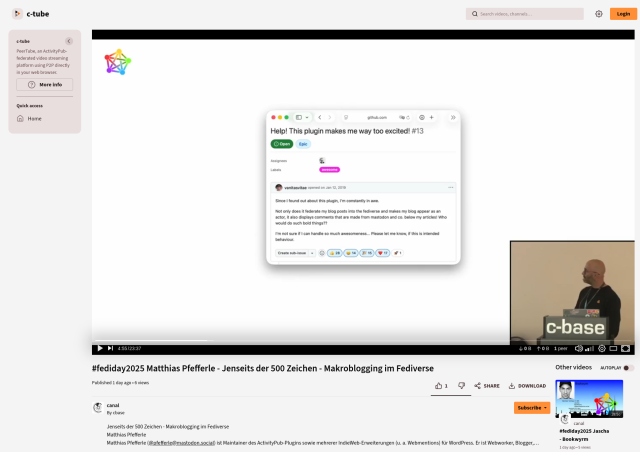
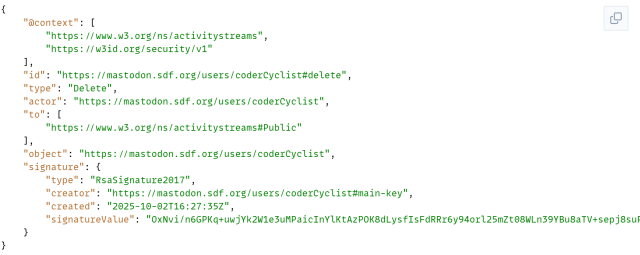



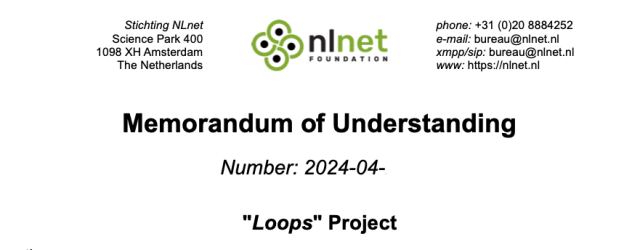
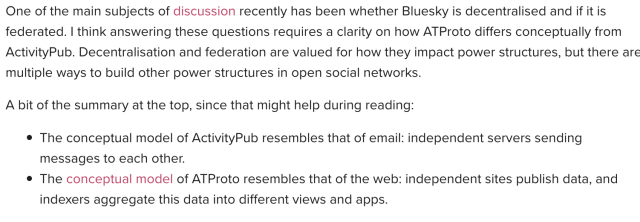
![Screenshot from the linked article reading:
"Next steps
• I [Matt Lee] want you to have a personal website and have your listening habits on your own website, not my website. But I know some people won't want that, which is fine but Libre.fm is effectively a silo (other than Last.fm which it talks to, although federation with other instances has been possible for a long time) and has over 372,000 registered users and 302 million scrobbles.
• Some new features will only work if you're publishing your Libre.fm stats on your own website.
• A new version of Libre.fm's front end will appear later, powered by Ruby on Rails.
• [highlighted] We're also going to put our full attention to supporting ActivityPub where possible. [end highlight]"
Screenshot from the linked article reading:
"Next steps
• I [Matt Lee] want you to have a personal website and have your listening habits on your own website, not my website. But I know some people won't want that, which is fine but Libre.fm is effectively a silo (other than Last.fm which it talks to, although federation with other instances has been possible for a long time) and has over 372,000 registered users and 302 million scrobbles.
• Some new features will only work if you're publishing your Libre.fm stats on your own website.
• A new version of Libre.fm's front end will appear later, powered by Ruby on Rails.
• [highlighted] We're also going to put our full attention to supporting ActivityPub where possible. [end highlight]"](https://fedi.ml/photo/preview/640/597178)
